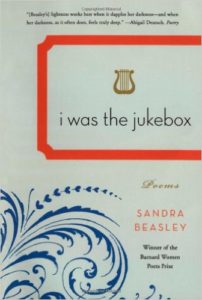I Was the Jukebox
 by Sandra Beasley,
by Sandra Beasley,
W.W. Norton & Company, 2010,
90 pages, hardcover, $24.95
ISBN: 978-0-393-07651-6
Buy the Book
In a poem from Sandra Beasley’s I Was the Jukebox, the poet offers an epigraph from conceptual artist John Baldessari: “As soon as you put two things together, you have a story.” Beyond merely name – dropping the visual arts, it seems that Beasley has accomplished in this book what so many of us have tried to do: She has found a way to make sense of the visual world, not by forcing a personal narrative upon it, but by allowing the mind to make its own connections, and this flexibility of thought and creativity has led to an astonishing and thrilling result.
The poems of I Was the Jukebox give voice to the mute and the inanimate — the platypus, the piano, the eggplant, the long-dead Greek hero on a first date with the narrator — but there are subtle shifts in the tone of these personae poems that keep them fresh as the pages turn. One such poem, “Cast of Thousands” speaks in the voice of an entire set of movie extras “My death is the clip they send to the Academy / later they will kill me in Spanish, then French.” Another utilizes the shape-shifting logic of dreams, allowing the narrator to speak as the eponymous jukebox. In this poem, “You Were You,” the narrator cum jukebox says to the beloved:
I dreamt we were in your favorite bar:
You were you. I was the jukebox.
I played Sam Cooke for you,
but you didn’t look over once.
I wanted to dance. I wanted a scotch.
I wanted you to take your hand off of her.
There is a real challenge in writing poems from the point – of – view of these objects, but on each page of this book, Beasley finds a way to present us with both the newfound perspective of the object alongside the deeply felt pathos or joy of the narrator.
In later passages of “You Were You,” the reader gets a sense of how marvelous it would be to become the jukebox: It glitters and shines and offers up the best of R&B, pop, and soul. And yet, we know that all the jukebox longs for is the partner across the room, seducing another woman.
What makes this collection work so well is not simply the new slant that Beasley gives to the world of experience. She also has a true feel for the sensual details, which makes the universes that these poems conjure as much of a joy to feel as they are to imagine. A particular favorite poem might be “I Don’t Fear Death,” in which Beasley pictures “field after field / of sorghum crisp to my touch.” Later, she describes the clouds, which are “yellow, smelling of / fireworks and salt.”
I can’t help but compare the Baldessari epigraph to Beasley’s first book, Theories of Falling, which was at times autobiographical, but still gave the sense that this poet would never be interested in simple narratives. Experience isn’t worth a thing if you can’t find a flame of desire in each of its moments, the book seemed to say. Here, in this second collection, Beasley takes brave new steps outside of her comfort zone, seeking new meanings, new juxtapositions, and new subject matter.
For some, the consistent disorientation of each newly voiced persona may lose some luster after awhile, but I say: Give it time. This is a smart book, and a well – crafted one. While the book may be challenging to read through in one sitting, these poems are worth many return trips.
— Thom Dawkins

